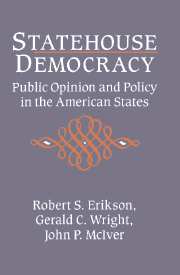Book contents
- Frontmatter
- Contents
- Preface
- 1 Democratic states?
- 2 Measuring state partisanship and ideology
- 3 Accounting for state differences in opinion
- 4 Public opinion and policy in the American states
- 5 State parties and state opinion
- 6 Legislative elections and state policy
- 7 Political culture and policy representation
- 8 Partisanship, ideology, and state elections
- 9 State opinion over time
- 10 Conclusions: Democracy in the American states
- References
- Index
7 - Political culture and policy representation
Published online by Cambridge University Press: 04 August 2010
- Frontmatter
- Contents
- Preface
- 1 Democratic states?
- 2 Measuring state partisanship and ideology
- 3 Accounting for state differences in opinion
- 4 Public opinion and policy in the American states
- 5 State parties and state opinion
- 6 Legislative elections and state policy
- 7 Political culture and policy representation
- 8 Partisanship, ideology, and state elections
- 9 State opinion over time
- 10 Conclusions: Democracy in the American states
- References
- Index
Summary
In Chapter 3, we accounted for state differences in mass ideology and partisanship in terms of state differences in “political culture.” We found that state of residence matters as an influence on political attitudes, although we stopped short of identifying the underlying sources of this state variation. In this chapter, we explore a different usage of the concept “political culture.” Here, we examine “state political culture” as a determinant not of mass attitudes but, rather, of the expectations and values that citizens (but mainly elites) share as they conduct the business of governing. We do not attempt to measure this sort of variation directly, but rather turn to Daniel Elazar's (1966, 1972) typology of political subcultures among the American states. This chapter examines whether states classified differently by Elazar in terms of political culture display different styles of representation in terms of the causal pathways from state opinion to state policy.
Elazar's typology undoubtedly is the most prominent contribution to the study of “political culture” in state politics. Elazar divides the U.S. states – and areas within states – according to their dominant political culture: moralistic, individualistic, or traditionalistic (MIT). In capsule form, the moralistic culture emphasizes the concern for the public welfare, the individualistic culture emphasizes politics as a marketplace, and the traditionalistic culture emphasizes the protection of traditional elites. Geographically, Elazar's moralistic states are mainly the northern tier of states settled by New England emigrants; traditionalistic states comprise southern and border states plus those settled by southern emigrants; individualistic states tend to be those geographically in-between.
- Type
- Chapter
- Information
- Statehouse DemocracyPublic Opinion and Policy in the American States, pp. 150 - 176Publisher: Cambridge University PressPrint publication year: 1994

